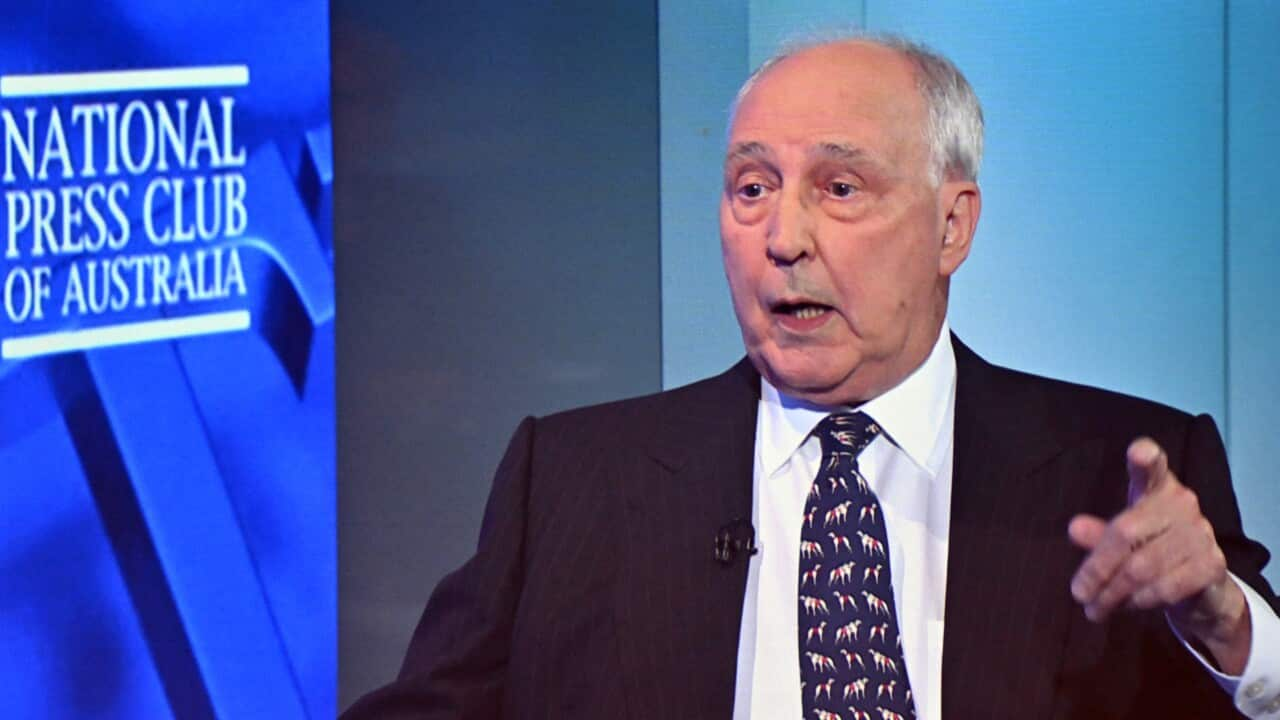KEY POINTS:
- Six former prime ministers signed a letter on Israel and Hamas, with one absentee.
- Paul Keating says he did not join the other signatories because he doesn't do 'groupthink'.
- Keating was the only living former prime minister not to sign on to the letter.
Paul Keating has explained his decision not to back a letter on the Hamas-Israel conflict, signed by all other living former prime ministers, saying: "I can do better than groupthink".
Speaking to The Australian Financial Review (AFR), Keating confirmed he had been approached by Jewish community leader Mark Liebler over the letter, but felt "seriously verballed" when News Corp reported he was set to sign on.
The — John Howard, Kevin Rudd, Julia Gillard, Tony Abbott, Malcolm Turnbull, and Scott Morrison — added their names to the letter, which stated. "there is no more tenaciously evil race hatred than antisemitism".
But Keating told the AFR he had always avoided joint statements from former leaders over 27 years since leaving office, despite being asked to join them "on many occasions".
"I can do better than groupthink," he said.
The AFR reported that Keating felt the original letter was too "sharp", and refused to sign it even after Turnbull intervened to make it more "even-handed".
We stand with Australia's Jewish and Palestinian communities, former PMs say
The six former prime ministers' statement said: "Whatever is happening elsewhere in the world, there is no place in our country for racial or religious hatred".
"We believe we speak for the vast majority of Australians, of all faiths and of none, when we say we stand in solidarity with Jewish Australians at this time," they said.
"Likewise, we stand too with the Australian Palestinian community whose families are dying and suffering in this terrible conflict. They too deserve our love and support.
"Our nation’s success depends on us not allowing conflict overseas to turn Australians against each other."

John Howard, Kevin Rudd, Julia Gillard, Tony Abbott, Malcolm Turnbull and Scott Morrison signed onto the statement. Source: AAP / James Gourley, Mick Tsikas, Roy Vandervergt, Dean Lewins, Joel Carrett, Lukas Coch
"The statement’s reference to ‘Australian values of love and respect’ rings hollow," APAN president Nasser Mashni said, adding that the letter "ignored the anguish that many thousands of Palestinian Australians are currently feeling.”
But the Executive Council of Australian Jewry described the letter as "a powerful rejection of the incitement to hatred and violence directed at Jews in Australia at anti-Israel rallies".
"This letter is a sober reminder of how fragile our multiculturalism is and how urgently anti-Semitism must be confronted," co-chief executive Alex Ryvchin said.
Thousands dead in Hamas-Israel war
The Gaza Health Ministry said Israeli airstrikes have killed more than 8,000 Palestinians since 7 October, that killed more than 1400 Israelis.
Human rights groups and the United Nations have been sounding the alarm over the deepening humanitarian crisis in the densely-populated Gaza Strip, where more than 2 million Palestinians live.
Asked about his views on Keating's abstention on Tuesday, Prime Minister Anthony Albanese did not answer directly.
"That’s a question for Paul Keating, I would have thought," he replied.
Albanese again acknowledged Israel's right to defend itself after Hamas' attack, but stressed how it did so mattered.
"We need to make sure as well, that every civilian life is valued, whether it be Israeli or Palestinian. Every innocent loss of life is a tragedy," he said.
"That is why we remain very concerned and continue to put forward our case, while we've provided humanitarian assistance to Gaza."
* With additional reporting from the Australian Associated Press.
Correction: A previous version of this story said 1400 Israeli civilians were killed in Hamas' 7 October attack. That number included Israeli soldiers. The story has been updated.










